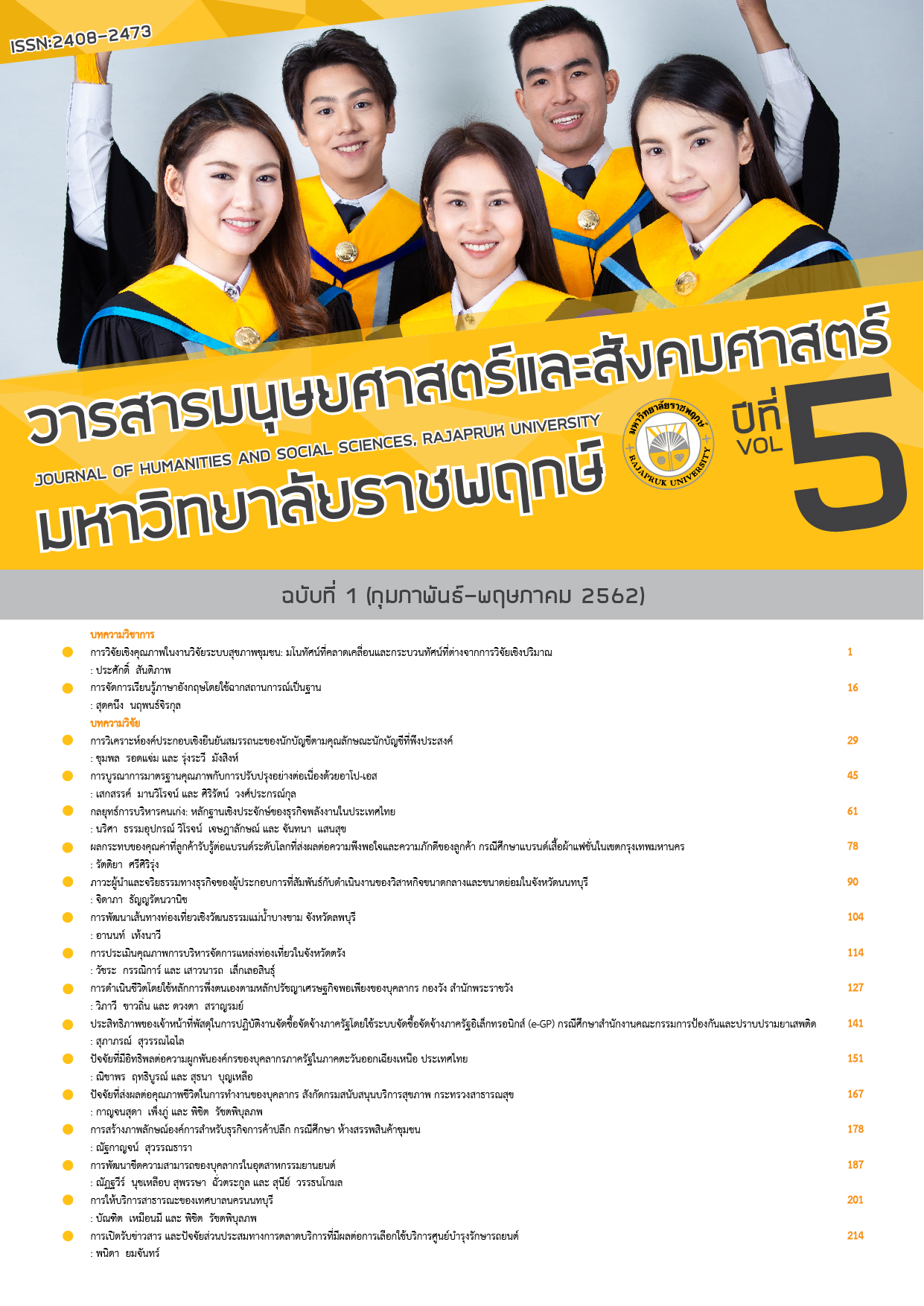Ways of Living Based on Sufficiency Economy Philosophy of Personnel in the Royal Bureau
Main Article Content
Abstract
The purpose of this research were to study the way of living based on sufficiency economy philosophy, the study of sufficiency economy philosophy and the comparison of the personal factors and the sufficiency economy 192 samples, lifestyle of personnel in Bureau of the Royal Household. The questionnaire used as a research tool and analysis data by using percentage, mean, standard deviation, t-test, One-way ANOVA and compare the Pairwise difference in Scheffé. The outcome of this research showed that the overall level of people who lived on sufficiency economy philosophy was in a very high level. Once considering in each aspect, the highest level was the environment, the second was economic, and the least was the body and mind. The way of living based on sufficiency economy philosophy was in very high level once considering each aspect, the highest level was the modesty, the second was the rational, and the least was the morality. Also estimate the difference of all aspects which showed that different gender affects the way of living in economic, social and environment at the 0.05 level of statistically significant. Along with the educational level, the difference of education affected the way of living in sufficiency economy philosophy at the 0.05 level of statistically significant in economic aspect.
Article Details
References
ดวงตา สราญรมย์. (2556). การดำเนินชีวิตตามหลักปรัชญาเศรษฐกิจพอเพียงชุมชนบึงบัว ตำบลลำผักกูด อำเภอธัญบุรี จังหวัดปทุมธานี. วิทยาลัยนวัตกรรมการจัดการ. ค้นเมื่อ 24 กันยายน 2557, จาก http://inno.vru.ac.th/doc/
นงค์จิตร พิลากุล (2553). การบริหารงานในสถานศึกษาตามแนวเศรษฐกิจพอเพียงของผู้บริหารสถานศึกษา สังกัดสำนักงานเขตพื้นที่การศึกษาเลย เขต 1. วิทยานิพนธ์ บัณฑิตมหาวิทยาลัย มหาวิทยาลัยนอร์ทกรุงเทพ.
นภาพรรณ วงค์มณี. (2553). การนำแนวปฏิบัติตามปรัชญาเศรษฐกิจพอเพียงไปใช้ในการดำเนินชีวิตของประชาชน: กรณีศึกษาชุมชนทรายทอง ตำบลเจริญเมือง อำเภอพาน จังหวัดเชียงราย. ค้นคว้าแบบอิสระศิลปศาสตรมหาบัณฑิต สาขาวิชาการจัดการภาครัฐ และภาคเอกชน บัณฑิตวิทยาลัย มหาวิทยาลัยศิลปากร.
มงคล อินทรโชติ. (2552). การบริหารโรงเรียนโดยใช้หลักปรัชญาเศรษฐกิจพอเพียงบองโรงเรียนระดับการศึกษา ขั้นพื้นฐาน สังกัดสำนักงานเขตพื้นที่การศึกษากรุงเทพมหานคร เขต 3. วิทยานิพนธ์ครุศาสตรมหาบัณฑิต สาขาการบริหารการศึกษา มหาวิทยาลัยราชภัฏธนบุรี.
ลำไย มาเจริญ และคณะ. (2554). พฤติกรรมการใช้จ่ายตามแนวเศรษฐกิจพอเพียงของอาจารย์ คณะบริหารธุรกิจ มหาวิทยาลัยเทคโนโลยีราชมงคลพระนคร. วารสารวิชาการศรีปทุม ชลบุรี, 8 (4): 53-58.
วชิรวิทย์ ก้านจักร. (2558). วิถีชีวิตของชาวไทญ้อ ในเขตตำบลคลองน้ำใสอำเภออรัญประเทศ จังหวัดสระแก้ว. วารสารมนุษยศาสตร์และสังคมศาสตร์ มหาวิทยาลัยราชพฤกษ์, 1(2): 70-80 ค้นเมื่อ 1 มีนาคม 2561, จาก https://www.tci-thaijo.org/index.php/rpu/article/ view/112353/87558
สำนักพระราชวัง. (2554). สำนักพระราชวัง. ค้นเมื่อ 15 มีนาคม 2560, จาก http://www.brh. thaigov.net/new/brh/about/brh_duty-web/029.htm
สุภาภรณ์ โกสีย์. (2550). พฤติกรรมการดำเนินชีวิตตามหลักตามหลักปรัชญาเศรษฐกิจพอเพียงของนักศึกษาสถาบัน อุดมศึกษาในจังหวัดสงขลา. มหาวิทยาลัยหาดใหญ่.
อรวรรณ แก้วมาตย์ และคณะ. (2558). การดำเนินชีวิตตามหลักเศรษฐกิจพอเพียงของนักศึกษา ภาคปกติ (คฤหัสถ์) มหาวิทยาลัยมหามกุฏราชวิทยาลัย วิทยาเขตอีสาน จังหวัดขอนแก่น. ปริญญารัฐศาสตรบัณฑิต สาขาวิชารัฐศาสตร์การปกครอง มหาวิทยาลัยมหา มกุฏราชวิทยาลัย.
Bureau. (2011). Bureau of the Royal Household. Retrieved on March 15th, 2018, from: http://www.brh.thaigov.net/new/brh/about/brh_duty-web/029.htm
Chamnankittichại, K. et al. (2011). Applying Sufficiency Economy Philosophy to the Life of Students Suan Dusit Rajabhat University. Research Report Suan Dusit Rajabhat University. (in Thai)
Intarachot, M. (2009).School administration using the Sufficiency Economy Philosophy, School of Basic Education under the Office of Bangkok Educational Service Area 3. The field of educational administration Thonburi Rajabhat University. (in Thai)
Kaewmart, O. et al. (2015) Living the Sufficiency Economy of Normal Students (Mahidol University), Mahamakut Buddhist University Northeastern Campus Khon Kaen. Bachelor of Political Science Department of Political Science Mahidol University Mahachulalongkornrajavidyalaya University (in Thai)
Kanjak, W. (2015). The Way of Life of Tai-Yoh in Khlong Namsai Sub-District Aranyapathet District Sa Kaeo Province. Journal of Humanities and Social Sciences, Rajapruk University, 1(2): 70 - 80. Retrieved on March 1st, 2018, from https://www.tci-thaijo.org/index.php/rpu/article/view/112353/87558
Kosi, S. (2007). Life style is based on Sufficiency Economy philosophy of the students. Higher education in Songkhla. Hatyai University. (in Thai)
Machareon, L. et al. (2011). Spending on Sufficiency Economy of Teachers Faculty of Business Administration Rajamangala University of Technology Phra Nakhon Journal of Sripatum University, Chonburi, 8 (4): 53 - 58. (in Thai)
Philakul, N. (2010). Administration in schools in accordance with the sufficiency economy of school administrators Under the Office of Loei Educational Service Area 1. Thesis University graduate North Bangkok University
Saranrom, D. (2013). Living the Sufficiency Economy Philosophy of the Bueng Bua Community, Lam Phak Kut District, Thanyaburi District, Pathumthani Province. College of Innovation Management. Retrieved on September 24th, 2014, from http://inno.vru.ac.th/doc/ (in Thai)
Wongmani, N. (2010). Implementation of the Sufficiency Economy Philosophy to be used in people's lives: case study of Sai Thong community Charoen Mueang Subdistrict, Phan District, Chiang Rai Province. Independent research, Master of Arts Department of Public and Private Management, Graduate School Silpakorn University.
Yamane, Taro. (1973). Statistics: An Introductory Analysis. 3rd ed. New York: Harper and Row Publication.


